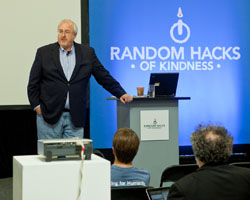“Random Hacks of Kindness” to Aid Emergency Response
Some of the digital world’s most bitter rivals have joined forces with government and public-sector organizations to develop solutions for disaster relief. An inaugural meeting November 12-14 in
 |
Software developers work on solutions to disaster response challenges at the Random Hacks of Kindness codejam held in |
Patrick Svenburg is a senior manager at Microsoft Federal who participated in the June Crisis Camp panel with counterparts from Google and Yahoo!. He explains that the “hacks” in the program’s name do not refer to computerized break-ins by malefactors. These benevolent hacks comprise constructive meetings by cooperative experts who seek to develop specific solutions for problems before they emerge. “We’re not trying to break into the Pentagon—nothing of the sort,” he emphasizes.
Instead, the group strives to develop solutions that may be unique to disasters such as Hurricane Katrina and the
Many of these small but critical solutions can be developed by bringing together major players who can concentrate on open solutions. So, Random Hacks of Kindness was formed to create a global community of developers and software engineers that can be connected with subject matter experts to generate these solutions, Svenburg relates. “The focus is not on the companies involved; it’s on building a sustainable community,” he says.
The November codejam featured about a dozen different problem statements that were shared with the more than 100 developers who attended the first event. Roughly seven of these statements were “hacked” by the attending developers, who developed tangible solutions, Svenburg shares.
FEMA Administrator Craig Fugate attended the event and gave a keynote address in which he outlined the government’s needs. Emphasizing that all crisis response begins with a local initiative, Fugate declared that the event’s technologists are essential for building a strong national emergency response team, Svenburg relates.
Fugate specifically challenged programmers to develop an easy way for families to put together emergency communications plans. Solutions to that challenge were the top winners of event prizes, one of which was given by FEMA. The FEMA Prize went to “Break Glass,” a simple means to build and retrieve an emergency family communication plan using a telephone.
 |
Federal Emergency Management Agency (FEMA) Administrator Craig Fugate addresses the more than 100 software developers attending the Random Hacks of Kindness codejam in November. |
The initiative already is spreading overseas. The group has received inquiries from people seeking to engage in similar activities in other countries such as
With the success of the November codejam in
“We provide a lot of Red Bull, pizza, good ambience and a meaningful site where people can exchange ideas and build software solutions,” he says.
Photography by Jeremy Johnstone, Yahoo! Inc.




Comments